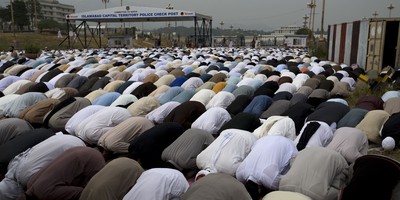Populism is all the rage these days. This election season we’ve heard it from both sides of the aisle, most despicably from a Democrat, John Edwards, and most dishearteningly from a Republican, Mike Huckabee. As the campaign has moved beyond the early voting states, these candidates have slipped from the public view. I fear, however, that their populist rhetoric—not to mention policies—may be here to stay.
More than at any time in recent memory, troubled citizens want the government to address their most basic problems. Whether it’s healthcare, the economy or the mortgage crisis the common thought process seems as follows: “I have a problem. What is the government going to do about it?”
This is a dangerous, if slightly understandable impulse—and it is one that Washington does nothing to curb. Consider, for example, that Washington’s response to the current economic slowdown consists largely of tax rebates despite the fact that supply-side tax cuts would do more to stimulate the economy by incentivizing work and investment in a way that a check-in-the-mailbox never will. But a rebate, of course, reinforces the notion that government gives and takes as it pleases, and that it can and will cater to the needs of its increasingly dependent citizens.
That brings us to the newly-released Index of Economic Freedom, a joint venture of the Heritage Foundation and the Wall Street Journal. Since 1995, the Index has measured 10 different categories of economic freedom in nearly every country in the world and compared those results on a global scale.
For Americans, the results of the Index are especially important this year. They serve as a barometer, a scorecard in the on-going battle between tax and regulation-heavy populism, and free market capitalism.
Investment
The United States scored 80 out of 100 in the Index’s category of investment freedom, tied with four other nations in second place. According to the Index, the U.S. received points because it does not require foreign investors to register with the federal government, nor does it restrict the purchase of real estate on a national level. The U.S. lost points, however, because of its restrictions on foreign investment in banking, mining, defense contracting, certain energy-related industries, fishing, shipping, communications and aviation. While the U.S. allows for relatively free investment, it should move to ease some of these restrictions in order to expand investment opportunities.
Recommended
Spending
Last year, U.S. government expenditures equaled 36.6 percent of gross domestic product. Thus, the U.S. rates 59.81 in the Index’s rankings for size of government; that’s fully 35 points behind Hong Kong, the most economically free nation in the world. Despite the severity of the problem, excessive spending has long been a concern limited mostly to political junkies and economists. No more. In an increasingly global and competitive economy, the U.S. must reduce its spending in order to limit public debt and foster private enterprise.
Business Climate
The Index confirms what many enterprising individuals have long known: America is a great place to do business. Accordingly, the U.S. received a 91.7 rating for business freedom. These high scores result, in part, from the fact that business owners are largely free to launch, maintain and close businesses with impunity. Across the globe, it takes an average of 43 days to start a new business. By contrast, one needs an average of only six days to start a business in the U.S.
A strong rating for labor freedom also contributed to the U.S.’s high business climate score, as flexible, market-driven employment policies bolster expansion, output and employment opportunities.
What’s It All Mean?
The Index’s overall rankings place the U.S. as the fifth-most economically free nation in the world. Clearly, this is a good thing. But, as Thomas Jefferson put it, “the price of freedom is eternal vigilance.”
One way we can remain vigilant in the protection of our economic freedom is to support the extension of the Bush tax cuts. Indeed, my friend Ed Feulner, president of the Heritage Foundation, has noted that if the Bush tax cuts are allowed to expire in 2010, the U.S. will almost certainly fall from its position among the five most economically free nations in the world.
Ultimately, true economic freedom stands in stark contrast to the populist instinct to encourage government meddling in the economy. In light of this, our duty this political season is clear: We must demand nothing less from our candidates than full support for true economic freedom for all Americans.






















Join the conversation as a VIP Member